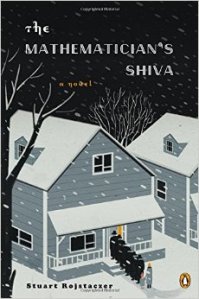 I can’t tell whether popular fiction or mainstream audience have encouraged the appetite for the pseudo-autobiographical ‘novel’. This, obviously, is not a new trend: Burroughs, Kerouac, Miller, and so on. These exaggerated true tales are popular, I suppose, because one writer’s self-discovery and enlightenment can be vicariously enjoyed by the reader. Thus, the consumer market is born. Stuart Rojstaczer’s The Mathematician’s Shiva is the newest member to this genre. The question is: how and where does the novel fit?
I can’t tell whether popular fiction or mainstream audience have encouraged the appetite for the pseudo-autobiographical ‘novel’. This, obviously, is not a new trend: Burroughs, Kerouac, Miller, and so on. These exaggerated true tales are popular, I suppose, because one writer’s self-discovery and enlightenment can be vicariously enjoyed by the reader. Thus, the consumer market is born. Stuart Rojstaczer’s The Mathematician’s Shiva is the newest member to this genre. The question is: how and where does the novel fit?
The Mathematician’s Shiva follows a Russian-emigrated Jewish family in the Midwest who gather to sit the seven days of shiva- Talmudic mourning- after the Matriarch’s death. As the title reveals, Rachel Karnokovitch was a mathematician, and quite a notable one. Despite recognition from President Clinton and her contemporaries, adequate fame seemed to allude Rachela. That is until Sasha Czerninski, her son (and the novel’s guiding voice) discovers his mother’s memoir. The pages construct and comment on Rachela’s tumultuous early life in the anti-Semitic Soviet Union and her greatest struggle: the Navier-Stokes equation. Meanwhile, Sasha and his Father scramble to discipline arriving family members and hordes of admiring mathematicians attending Rachela’s funeral – as well as some unexpected guest from the past. As expected, the week-long event breeds more controversy and comedy than any family member ever expected.
Within the first chapter, the reader is aware that character Sasha and author Stuart speak Hebrew. Correction: they do not only speak Hebrew – their lives are inundated with it. Assimilated throughout the novel are Judaic inspired phrases, as well as some Polish(where the other part of Sasha’s family derives), to better explain the Karnokovitch and Czerninski experience. Many eye-opening moments occur using this device. Yet the reader’s pleasure is coupled with pain when the foreign tongues are used to describe banal happenings.
Good:
‘The Hasidic Jews have a word, ‘dveykus’, for me who always possess the spirit of God inside them. My mother, unlike my grandfather, did not believe in such things literally, but when it came to understanding mathematics, she knew that she possessed the equivalent of dveykus. Like a rebbe with acolyte who feel blessed just to be around someone whose goodness and spirituality are always present, my mother had her followers. I had been been with them all of my childhood. They sought me out for my secondhand dveykus even as an adult. Now they would come (to the funeral) and I would have to be their gracious host for seven days, the days of shiva that are a traditional part of Jewish mourning. My uncle called them the ‘szalency’, the crazy people. Yet he would supply the vodka, and soothe them in his own way.”
Bad:
“My mother had what in Yiddish are called ‘bzikes’ – it comes from the Polish word ‘bziki’ and ‘issues’ I guess is the closet translation – and she had so many of them that some might have viewed her as a possible walking tic. My father, when they were together, off and on accommodated, no, more like celebrated, every one of these bzikes. I think I know exactly why. Her craziness was happily wed to her intellect. There are no reasonably geniuses in this world, I am convinced.”
Sasha and Stuart’s heritage is not simply a view on Rachela’s past. Much of Mathematician’s Shiva is concerned with the contemporary Jewish family, specifically the one brought together by funeral. As expected, the characters that arrive at the Czerninski house are not without comically and/or dramatically checkered histories. Some of their topics include Kabbalah, Judeo-Christian intermarriage, and reconnection with a estranged child. All of these instances are expected in entertainment of this sort; many in Mathematician’s Shiva are intriguing enough:
“‘No one could have predicted that Catherine (Ed: Sasha’s first wife) would go to the other side of the earth.’ I could have pointed out that no Slav or Eastern European Jew could have predicted this. We expect and demand people to maintain bonds with family. It doesn’t matter wether you love or hate your relatives, even ones you’ve legally divorced. As long as there are children involved, you stick together. Of course, my mother didn’t follow this rule when it came to me, but there were extenuating circumstances (read: Soviet) circumstances.”
Being unversed but interested in the world of mathematics, The Mathematician’s Shiva was occasionally an unstoppable read. This was also helped by Stuart’s laconic expression and prose. However, and perhaps I have been inhabiting the bottom side of a rock, but does this non-fiction narrative sound similar to Jonathan Tropper’s book – and recently released film – This is Where I Leave You? That story follows a fellow shiva sitting family who is begrudgingly brought together at the behest of the late father. Thus, recalling the autobiographical fiction genre, there is now a subsection: the post-mortem Jewish memoir. Or maybe the similarity between the ‘novels’ is simply a coincidence. Either way, The Mathematician’s Shiva is a subtly entertaining read about mathematics and Jewish emigre life in Midwestern American – but be wary, you may have heard this story before.